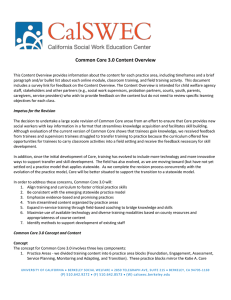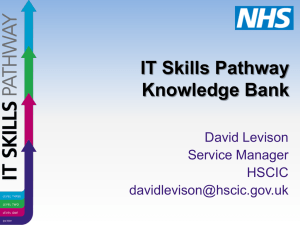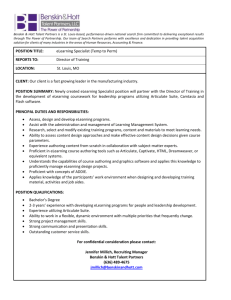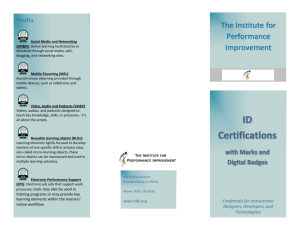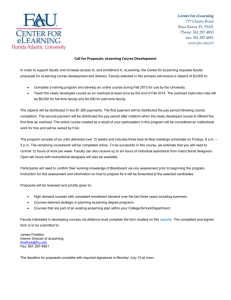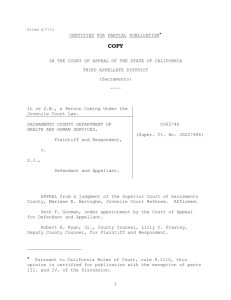Fact Sheet
advertisement
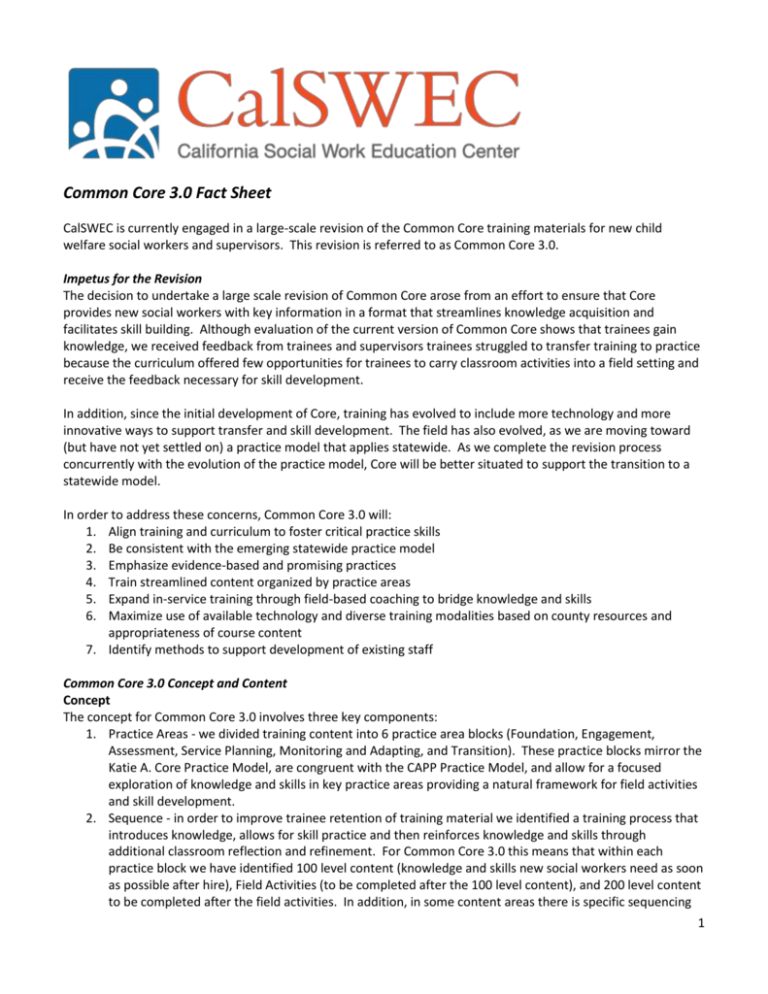
Common Core 3.0 Fact Sheet CalSWEC is currently engaged in a large-scale revision of the Common Core training materials for new child welfare social workers and supervisors. This revision is referred to as Common Core 3.0. Impetus for the Revision The decision to undertake a large scale revision of Common Core arose from an effort to ensure that Core provides new social workers with key information in a format that streamlines knowledge acquisition and facilitates skill building. Although evaluation of the current version of Common Core shows that trainees gain knowledge, we received feedback from trainees and supervisors trainees struggled to transfer training to practice because the curriculum offered few opportunities for trainees to carry classroom activities into a field setting and receive the feedback necessary for skill development. In addition, since the initial development of Core, training has evolved to include more technology and more innovative ways to support transfer and skill development. The field has also evolved, as we are moving toward (but have not yet settled on) a practice model that applies statewide. As we complete the revision process concurrently with the evolution of the practice model, Core will be better situated to support the transition to a statewide model. In order to address these concerns, Common Core 3.0 will: 1. Align training and curriculum to foster critical practice skills 2. Be consistent with the emerging statewide practice model 3. Emphasize evidence-based and promising practices 4. Train streamlined content organized by practice areas 5. Expand in-service training through field-based coaching to bridge knowledge and skills 6. Maximize use of available technology and diverse training modalities based on county resources and appropriateness of course content 7. Identify methods to support development of existing staff Common Core 3.0 Concept and Content Concept The concept for Common Core 3.0 involves three key components: 1. Practice Areas - we divided training content into 6 practice area blocks (Foundation, Engagement, Assessment, Service Planning, Monitoring and Adapting, and Transition). These practice blocks mirror the Katie A. Core Practice Model, are congruent with the CAPP Practice Model, and allow for a focused exploration of knowledge and skills in key practice areas providing a natural framework for field activities and skill development. 2. Sequence - in order to improve trainee retention of training material we identified a training process that introduces knowledge, allows for skill practice and then reinforces knowledge and skills through additional classroom reflection and refinement. For Common Core 3.0 this means that within each practice block we have identified 100 level content (knowledge and skills new social workers need as soon as possible after hire), Field Activities (to be completed after the 100 level content), and 200 level content to be completed after the field activities. In addition, in some content areas there is specific sequencing 1 for online modules and classroom training as the online modules are prerequisites for the classroom experience. 3. Modality - in an effort to maximize the limited training time available, we identified knowledge based content that can be provided via online training. This will allow for classroom time to focus on interactional skill building activities between trainees and trainers and among trainees. In addition, we identified specific skills for further development through field activities and field based training and coaching with field advisors. Content The tables below outline the content for Common Core. Each table includes one of the six practice areas. Within each practice area, content is identified by modality (online, classroom, and field). Timelines are provided for each activity. Please note that timelines for elearning modules are estimates and some participants may complete them more quickly while others may require more time. Also, field activity timelines are estimates and are based on time needed to complete work activities and meet with the field advisor. 100 Level Elearning 100 Level Classroom Field 200 Level Block 1 – Foundation Orientation to common core Social worker safety 90 minutes 60 minutes Federal and state laws Intro to CWS data 90 minutes 60 minutes Legal procedures Documentation practice and report writing 90 minutes 120 minutes Time and stress management Values and ethics 60 minutes 60 minutes Values and ethics in practice Fairness and equity ½ day ½ day Legal procedures and responsibilities ICWA and working with Native American ½ day families and Tribes ½ day Teaming, collaboration, and transparency Intro to CWS/CMS 1 day ½ day Trauma-informed practice 1 day Legal procedures and responsibilities (case ICWA activity (TBD) presentation, testimony, attorney social 1 hour worker meeting) 4 hours Teaming practice (team meeting activities Cultural competency activity (TBD) including placement and concurrent planning) 1 hour) 4 hours Advocacy (social worker advocacy and SW safety (consult with field advisor about facilitating self-advocacy; psychotropic safety policies and procedures) medication) 1 hour 4 hours Online - ICWA review and expert witness (90 Minutes) Classroom - Knowledge and Skill Reinforcement (1 day) Possible content: Values and ethics skills lab Fairness and equity and child development Laws and legal procedures skills lab Report writing skills lab (CWS/CMS integration) Teaming and collaboration skills lab 2 100 Level Elearning 100 Level Classroom Field 200 Level 100 Level Elearning 100 Level Classroom Field 200 Level 100 Level Elearning 100 Level Classroom Field 200 Level Block 2 – Engagement Concurrent planning introduction 90 minutes Authority and courtesy 60 minutes Interviewing 90 minutes Engagement and interviewing 1 day Interviewing (observe interview) Case review / family finding (case mining) 2 hours 1 hour Engagement (practice engaging with family) 2 hours Classroom - Knowledge and Skill Reinforcement (1 day) Possible content: Promising practices for engaging with key Investigative interviewing child welfare populations Motivational and solution-focused Critical thinking skills lab interviewing Engagement and interviewing skills lab Block 3 – Assessment Overview of investigation and assessment Child maltreatment identification procedures 120 minutes 120 minutes Introduction to child development 60 minutes Critical thinking and assessment Child maltreatment identification skills ½ day practice 1 day Assessment skills lab Assessing for key child welfare issues 1 day 1 day Presenting safety and risk assessment Completing assessment tools information in teams 2 hours 2 hours Classroom - Knowledge and Skill Reinforcement (1 day) Possible content: Critical thinking in safety and risk Advanced CMI – Focus on Neglect assessment skills lab Advanced assessing key child welfare Child and youth development skills lab issues Block 4 – Service Planning Case planning basics Intentional visitation 90 minutes 90 minutes Behavioral objectives Case planning and concurrent planning in a ½ day team setting ½ day Writing behavior-based case plan objectives Engaging family members in case planning 1 hour 1 hour Visitation observation Facilitating safety networks 1 hour 1 hour Classroom - Case Planning and Concurrent Planning skills lab (1 day) 3 100 Level Elearning 100 Level Classroom Field 200 Level 100 Level Elearning 100 Level Classroom Field 200 Level Block 5 – Monitoring and Adapting Monitoring and adapting Placement 60 minutes 60 minutes Managing the plan Placement safety, stability, and well-being ½ day ½ day Writing progress notes on behavior-based Team-based case planning (observe case objectives with assigned caseload planning with a team at case plan update) 1 hour 1 hour Placement stability 1 hour Classroom - Managing change (1 day) Block 6 – Transition After 18 60 min Case closure 60 min Transition practice 1 day Transition in teams (observe a team planning a After 18 activities (practice engaging with nontransition) minor dependent youth) 1 hour 1 hour Developing a transition plan 1 hour Classroom - Knowledge and Skill Reinforcement (1 day) Possible content: After 18 skills lab Transition practice 4
